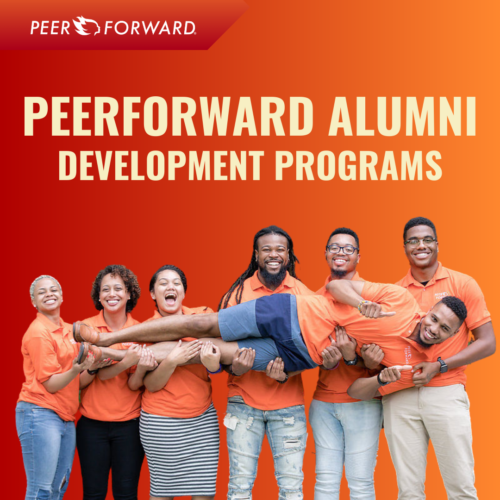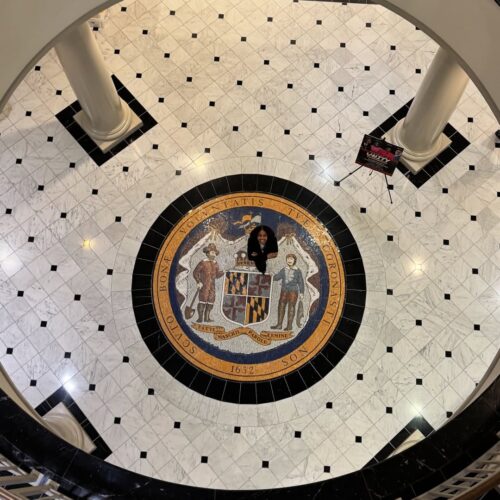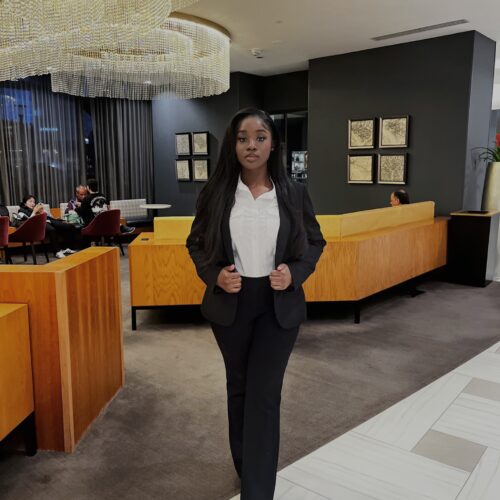At PeerForward’s Power of Peer Leadership fundraising event in April 2022, we had the pleasure of hearing from one of our distinguished alumni, Jessica Solomon. Alumni like Jess show us all that by helping young people on the path to college, we are investing in the next generation of community leadership. Leadership Council member Gordon Deans spoke with Jess about how a College Summit workshop in 1999 catalyzed her career trajectory and revealed to her the impact of peer-to-peer influence. Read on or watch below for the full interview.
Gordon: Our Peer Leader teams are doing inspiring work promoting equity in their communities. This work does not stop when they become alumni, as our next guest can attest. Jess Solomon is not only an alumna of College Summit, which is PeerForward’s former name, she also interned with the organization during college. Jess attended a workshop in 1999, and after graduating from high school she went on to get her Bachelor’s in Communication Studies and African American Studies at University of Maryland College Park, followed by a Master’s in Organizational Development from American University. She is now an organization development practitioner and cultural steward, helping develop more impactful, creative, and equitable organizations to meet this moment. Jess is known for her adaptive leadership and wholistic creative approach to organization development and systems-level change. Since 2015, her firm Art in Praxis has facilitated change at the nexus of arts and culture, social justice, and philanthropy, building capacity for people and organizations to advance social change and culture. Good evening, Jess! Thank you so much for being with us here today. How are you doing?
Jess: Gordon, I’m well, it’s great to be here! I’m excited to jump in the conversation about my time with College Summit, also known as PeerForward.
Gordon: Excellent, we’re really excited to have you. So Jess, why did you go to a College Summit workshop?
Jess: I think it’s important to set the context. I participated at George Washington University in 1999, and there was no Facebook or TikTok, the Internet was still a hobby. I can remember typing out my college essay on a typewriter at one point. I definitely didn’t have a cell phone. I lived and went to high school in Baltimore, and so it was a big deal for me to go to DC to this thing that, you know, the flier looked great, but I knew that I wanted to go to college and my family wanted me to go to college, but I didn’t know how to get there, and so that was the whole premise of the workshop. That was why I decided to go – it felt like it was worth the risk.
Gordon: Absolutely. You were just in the right place at the right time, and you took a leap for it. That’s amazing. Why did you stay involved with the organization?
Jess: Well, I was really hooked by the community and people I met at the workshop. I met people who went to my high school, I met people who went to high school in DC. I got a chance to really sit down and think about what I wanted for my future. At 16, 17 years old, that’s a big deal. And I got to do it in a space with other young people who were also thinking about that for themselves. I took all those tools and applied to a bunch of schools and got into a bunch of schools, and then I was really hooked, because I knew that the formula worked. I even got my younger cousin involved in College Summit after she watched me go to college and graduate, so that felt like a full circle moment for me as well.
Gordon: You had your own peer moment right there!
Jess: I did! I was a Peer Leader before it was “Peer Leader”!
Gordon: On that note, how did you see the concept of peer leadership develop from your first workshop through your time as a volunteer with the organization?
Jess: Once I started college, I came back as an alumni leader, and I see a few of my folks in the chat who were also alumni leaders with me! Then from there I think I served in every role at a workshop. It felt like it was a rite of passage, almost, to move on to those different goals. And then I came back as a staff member full time, supporting programs and development, and learning a lot about nonprofit leadership. While I was on staff, I really got to see the evolution of peer leadership. I think when I came around in 1999, College Summit at the time was still growing into itself: there was a formula, we knew it worked, I knew it worked, and there was also something around the participants, how to get the folks who go through the experience to really go back and feel compelled to not only talk about the workshop, but really get their friends and peers involved. Not just their friends, but people who they may share lunch period with, or the bus ride back home with. Really thinking about that responsibility as a participant to come back and bring people along with you – I got to see that take shape in a lot of different ways in my different roles at College Summit at the time.
Gordon: Amazing, thank you for sharing. How did your experience with the program prepare you specifically for your journey into college and your career after that?
Jess: I think even as a participant you had to stand up and talk about who you are and your story. Just those opportunities to practice public speaking, practice leading, those were early memories. Looking at the rap directors, who were the people who really facilitated the deep conversations at nighttime – they looked like me, and they were young, and they were fun. Seeing that those were real roles and real things that I could possibly do, it wasn’t something that was made up – I see this person. For me it really set the tone for how I approach my work and what does it mean to be a facilitator, and that can be in a lot of different ways. PeerForward/College Summit really opened me up to reimagining what professionalism looks like, what professional development looks like, at a time when I didn’t know what that was.
Gordon: You mentioned your work, could you tell us a bit more about the work you’re doing at Art in Praxis? What inspired you to start that organization?
Jess: Sure. Actually, my rap director, Teresa Adda, who was my boss at College Summit, was in a graduate program studying organization development and I was like, “What is that?” And I looked it up and I said, “This feels right, this feels like something I want to do.” That started me on my scholarly journey, and ultimately developing my own company. What Art in Praxis does is that we are an organizational development firm and we work with change-makers around aligning culture, strategy, and process to build their capacity to do better work. We feel like amazing, transformative work cannot be incubated inside of dry, uninspired spaces.
Gordon: Couldn’t agree more. The mental and physical spaces that we work in and that we learn in are truly important. Thank you Jessica for talking to us tonight.
Jess: I have a question for you, Gordon! What is your hope for the near future of PeerForward? In your role with the Leadership Council, what do you hope to see in the next two years as it relates to peer leadership development or just the growth of the Leadership Council?
Gordon: That’s a great question. In the first part about the future of the organization, I think this past year has been truly transformational in the expansion to a global organization: we’re in Bermuda now. For me personally, I think the expansion into college is really important. I think the organization has quickly recognized that while the high school program got students into college, got them through the door, there was a lack of continued support there. Similar to the challenges that the students have in high school, freshmen and sophomores found navigating and accessing financial, academic, and even health care aid very challenging, and many started to drop out. I think Gary and the company are true visionaries in identifying this program, and I think the organization is on a very upward trajectory. For us on the Leadership Council, we’re currently 11 dedicated volunteers. I’d love if we were 111 so we can spread the work more and get to more schools, volunteer in more places, have more fundraisers and keep the momentum of the organization moving forward.
Jess: Great, well thank you so much.
Gordon: Thank you as well, it has been a true pleasure talking to you tonight, and with that I will hand it back to our majestic MC, Mr. Tim Spicer!











